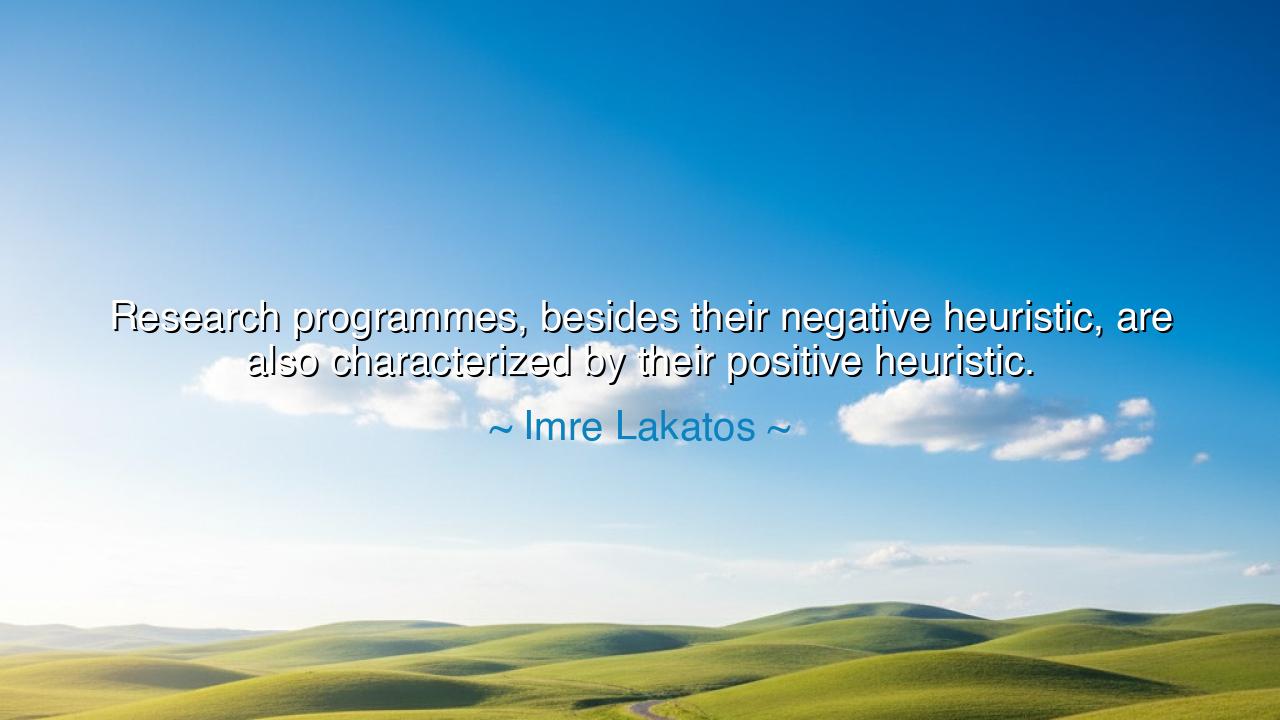
Research programmes, besides their negative heuristic, are also
Research programmes, besides their negative heuristic, are also characterized by their positive heuristic.






The words of Imre Lakatos — “Research programmes, besides their negative heuristic, are also characterized by their positive heuristic.” — are the teachings of a philosopher who sought to bring clarity to the method of science. They remind us that the pursuit of knowledge is not only a path of rejection, where falsehoods are stripped away, but also a path of creation, where new directions are lit and the spirit of discovery is guided toward fruitful inquiry.
The negative heuristic is the shield — the rules that protect the core of a theory, warning researchers what must not be questioned if the programme is to endure. It is the sacred ground, the assumptions upon which the rest is built. Yet to stand only in defense is not enough. Thus Lakatos speaks also of the positive heuristic — the guiding torch, the suggestions that lead inquiry forward, showing where to look, how to expand, and what new paths to follow. In this, science is not merely destruction of error, but the building of new temples of truth.
The ancients too understood this balance. When Euclid laid out his geometry, he established axioms (negative heuristics) that could not be touched, but from them unfolded propositions and theorems (positive heuristics) that guided generations in uncovering new structures of thought. Similarly, Newton, with his laws of motion, forbade certain contradictions, but also opened the floodgates for centuries of exploration, guiding the course of physics. In both cases, progress came not from tearing down alone, but from knowing what to protect and where to venture.
Lakatos’ insight is born of his desire to refine Karl Popper’s vision of falsification. Where Popper saw science only as the testing and rejection of theories, Lakatos added depth: science must also inspire, providing a positive heuristic to lead researchers toward discovery rather than leaving them lost in endless refutations. Without such guidance, inquiry becomes chaos; with it, inquiry becomes a purposeful march into the unknown.
Let the generations remember: the path of knowledge requires both restraint and direction. The negative heuristic preserves the heart of an idea from premature destruction, while the positive heuristic points the way forward to fertile fields of discovery. Imre Lakatos’ words remind us that science is not only the art of saying no to falsehood, but also the art of saying yes to new possibilities. It is a discipline that protects its roots even as it reaches for the heavens.






HHuhuhuhh
Lakatos introduces an intriguing view of scientific progress. The negative heuristic offers a framework to eliminate faulty theories, but the positive heuristic seems to fuel ambition in scientific discovery. I wonder, can these two heuristics ever be in direct conflict? For example, does the drive to explore new ideas sometimes override the caution that the negative heuristic offers, potentially leading to flawed research or conclusions?
HMHo minh
The idea of positive and negative heuristics in research is thought-provoking. On the one hand, the negative heuristic serves as a safeguard, but the positive heuristic drives research forward. My concern is that overemphasis on the negative side could lead to stagnation. Can researchers truly innovate if they are too focused on avoiding potential errors, or is it essential to take risks in order to advance knowledge?
BNDam Bich Ngoc
Lakatos' concept of positive and negative heuristics seems to reflect the ongoing struggle in research between caution and boldness. Negative heuristics prevent us from falling into scientific traps, but positive heuristics seem to be the engine of discovery. How do researchers maintain this balance? Is it possible for a research program to succeed without a strong positive heuristic pushing the boundaries of knowledge?
TPAnh Thu Pham
Imre Lakatos presents an interesting perspective on research. The negative heuristic ensures that we don’t blindly follow faulty ideas, but the positive heuristic seems to push for continual progress and new hypotheses. Does this imply that scientific programs must always have an element of exploration? Can the positive heuristic ever become too speculative, or is that the nature of scientific inquiry itself, always seeking the unknown?
TLThang Le
This quote made me think about the dual role of heuristics in research. Negative heuristics help ensure we avoid errors and flawed reasoning, but the positive heuristic pushes us to discover new paths and solutions. The balance between these two forces seems crucial. How often do research programs focus too much on the negative side, and does that stifle creativity and the pursuit of bold ideas in science?